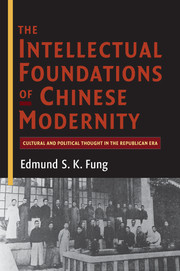 The Intellectual Foundations of Chinese Modernity
The Intellectual Foundations of Chinese Modernity Book contents
- Frontmatter
- Contents
- Acknowledgements
- Abbreviations
- A Note on Romanization
- Introduction
- 1 The Push of Westernized Radicalism
- 2 The Pull of Cultural Conservatism
- 3 The Politics of Modern Chinese Conservatism
- 4 Liberalism in China and Chinese Liberal Thought
- 5 The State, Government and the Rule of Law
- 6 The Rise of Reformist Socialist Thought
- 7 From State Socialism to Social Democracy
- Conclusion
- Glossary
- Selected Bibliography
- Index
- References
3 - The Politics of Modern Chinese Conservatism
Published online by Cambridge University Press: 03 May 2010
- Frontmatter
- Contents
- Acknowledgements
- Abbreviations
- A Note on Romanization
- Introduction
- 1 The Push of Westernized Radicalism
- 2 The Pull of Cultural Conservatism
- 3 The Politics of Modern Chinese Conservatism
- 4 Liberalism in China and Chinese Liberal Thought
- 5 The State, Government and the Rule of Law
- 6 The Rise of Reformist Socialist Thought
- 7 From State Socialism to Social Democracy
- Conclusion
- Glossary
- Selected Bibliography
- Index
- References
Summary
This chapter continues our exploration of conservative thought with a different focus on the relationship of cultural conservatism to nationalism and modernity. I begin with a 1976 essay by Benjamin Schwartz on conservatism in general and in China in particular. Schwartz stated that conservatism in China was largely cultural conservatism and not political conservatism because ‘few members of the articulate Chinese intelligentsia [were] prepared to defend the current sociopolitical order as a whole’. He attempted to show that Chinese conservatives were different from Edmund Burke, who affirmed the prevailing political order in late eighteen-century England, despite his criticism of aspects of it. Burkean conservatism is noted for its respect for freedom and defence of the liberal tradition. His essay has influenced an entire generation of students of conservatism in the PRC. In Western scholarship, as recently as 2005, Peter Zarrow has suggested that it is useful to distinguish between culture and politics so that a given intellectual could be understood as culturally conservative and politically reformist.
Both Schwartz's statement and Zarrow's suggestion are correct but need qualification, because cultural conservatism was in fact profoundly political. It is a truism that culture and politics in China were not separate and distinct; neither author would have argued otherwise. The fact that few members of the intelligentsia were prepared to defend the prevailing sociopolitical order as a whole does not mean that they all sought the same kind of political system or supported the same extent of political change.
- Type
- Chapter
- Information
- The Intellectual Foundations of Chinese ModernityCultural and Political Thought in the Republican Era, pp. 96 - 127Publisher: Cambridge University PressPrint publication year: 2010


